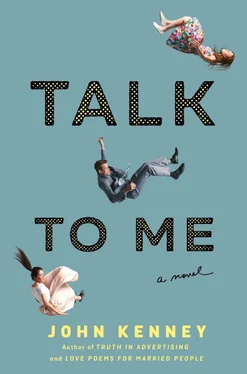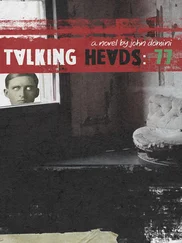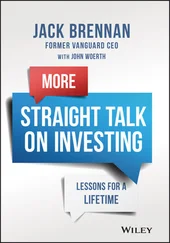“She’s gone, Ted. You fucked it up. But you’ll be fine. It’s not like you’re a hedge fund manager who actually did real harm. Or a lying politician. I mean, what did you do? You called someone a Russian whore. If I had a nickel for every time I did that in a day…”
Diana looked at Ted and he had the distinct impression that she was deciding whether or not to suggest a room next week, midday, at the Four Seasons.
A black Cadillac Escalade pulled into the long drive, the tires crunching along the gravel.
Ted said, “Why aren’t we happy?”
Diana looked at Ted for a time, a half smile on her face, as if trying to figure out if Ted was serious.
“Sweet Ted. You really are lost, aren’t you? Only a buffoon or a morning talk show host asks that question. This is America. We’re lucky, not happy. We’re rich, which is better than happy, better than everything. We’re healthy. Look at my teeth, Ted. It’s like a perfect photo of teeth. Cost me thirty-five thousand dollars. Happy? I mean… that’s like asking if there’s a God. Here’s what I know. I don’t care for abstracts. I like a planned day. So tomorrow late morning I’m getting on a private jet and flying to Telluride to meet my perennially erect husband, who will have ‘secretly’ had sex with his twenty-two-year-old assistant. We’ll ski. The kids will do what they do. Smoke pot, copulate with similarly spoiled private school teenagers, stare at their phones as if they were the face of Jesus incarnate. Happy? What a funny little man you are. But with the help of prescription medication and a small handful of made-up stories I tell myself in the moments before sleep, I stay sane.”
The driver got out, opened the back door for Ted. Diana handed him back his sports coat.
She snorted. “‘You’re the man who’s fucking my wife.’ Why can’t you tell the truth like that on your little newscast? You’d be a star.”
The world continued to make news and Ted continued to report on it each evening. But his own world was closing in. He was becoming the story.
Protestors had begun appearing in front of the network headquarters in Midtown. At first, when the story broke, it had been a small group of mostly women, a few signs. But a movement had grown. Dozens of protestors arrived each morning. They had created a website with a GoFundMe page. Volunteers showed up by the busload and set up tables and hot coffee and donuts. Building security, at the network’s behest, had tried to disperse the crowds and force them off the sidewalk but that backfired spectacularly when a guard pushed a young woman too hard, the woman slipping and falling on the sidewalk, opening a small cut on the back of her head that required stitches. The young woman was fine, but the video and still photos that followed—Ted’s large head in a split-screen with the young woman with blood on her face—simply poured gasoline on the already growing fire.
The head of the National Organization for Women urged a boycott of Ted’s newscast, launching #TEDGRAYSONISAWHORE.
The Russian Consulate in New York issued a strongly worded statement demanding an apology from Ted and Ted’s network, saying both had defamed Russian women.
Rachel Maddow did an entire show on Ted, expanding the subject to misogyny, the power struggle between men and women, female pay inequality, and the continuing danger white men posed to women and society as a whole.
The New York Post ran unflattering photos of Ted, face contorted, with headlines like this: SKANCHOR MAN; TED MAN WALKING; and, somehow finding a photo where it looks like Ted is laughing, HO, HO, HO!
A new episode of South Park had a newscaster character named Fred Whiteman yelling at a blind nun, tripping the woman, and stealing her Bible.
• • •
Advertisers were being urged by some groups to boycott Ted’s newscast. They met in hastily called meetings, high above Manhattan’s filthy streets, behind closed doors, trying to assess the PR risk in being associated with Ted’s broadcast versus the benefit in reaching a wonderfully impotent, incontinent audience. Morality versus money. It was an easy call. Corporate America stayed with Ted.
• • •
At scheisse , Franny sat in meetings to discuss what stories they were focusing on. She listened as people talked about “Ted Grayson.” People in her group covering it, writing about it, researching Ted’s life. She didn’t know what to do, to say. A story formed in her mind. She knew how to tell it. She knew all the facts, all the players, the timeline. It was the story of her life. Ultimately, of course, she said nothing. She stopped going to meetings. She wrote her stories. And as luck would have it, an NFL player had been caught on video pushing down women and children while trying to escape a false fire alarm in a Las Vegas hotel. So, there was a good story for a week or so.
• • •
If only he hadn’t taken the anchor chair. He blamed Claire. Of course, he blamed Claire for everything bad, including Pearl Harbor, the Kennedy assassination, and any time he burned his mouth on hot soup. Claire was to blame.
Ted had told himself the story that Claire had wanted him to take the job. Fame, money, entrée into the world of Claire’s moneyed West Hartford people. Claire a third-generation Miss Porter’s girl. But that was bad reporting. Check the facts, Ted.
The affiliate in Boston had given way to a job in Washington, where Ted covered the Pentagon. He and Claire had rented a Federal-style town house on P Street in Georgetown. It had a run-down, musty charm. The fireplace worked and Claire loved having a fire in the evening. After Franny’s bath, Ted would come home and the three of them would sit close to the fire, Franny in her pajamas, the kind with the feet in them, a zipper up the front, her plump, round body, bath-smelling body plopped in her father’s lap.
Ted remembered the night he came home and told Claire. He was later than usual and Franny was asleep and Claire was roasting a chicken in a Le Creuset they had received as a wedding present. Claire’s comfort meal. “I was thinking of roasting a chicken,” she’d say. It meant family. Ted hadn’t known what a Le Creuset was and made fun of it, referring to it when Claire mentioned dinner. “Will it be in the Le Creuset?” Ted would ask, needling her. “You know I must have it in the Le Creuset, otherwise I can’t eat it.”
He asked about Franny. Claire told the small stories of the day, the things Franny had said, interactions with someone at the supermarket, at the dry cleaner’s. She had been an early talker, blurting out whatever came to her mind, obsessed with all things pink. “I like your pink pants!” she’d yell to a woman in line at a coffee shop.
Ted listened with a smile on his face. He would sneak into her room when he went upstairs to change out of his suit, peek in on her, put his face close, smell her skin, her breath.
Ted kept a bottle of Stolichnaya vodka in the freezer and took it out, poured himself a small glass. He poured Claire a glass of white wine. He always waited with personal news. He held it, drew it out, the surprise of it. He knew and Claire didn’t and in that knowing he felt something exciting. Maybe that’s what had drawn him to news, to the knowing of a thing when so many didn’t.
“I talked to Simon today,” Ted said as casually.
“You talk to Simon every day,” she responded, sautéing green beans.
“They’re moving George out of the chair.”
George Beebe, Hal’s replacement.
Claire looked up. “What? Why?”
“Bad ratings.”
“But it’s only been six months. What do they expect after Hal?”
Читать дальше












